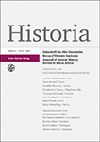
HISTORIA-ZEITSCHRIFT FUR ALTE GESCHICHTE
Scope & Guideline
Transforming Perspectives: Interdisciplinary Dialogues on Ancient Narratives
Introduction
Aims and Scopes
- Political History and Governance:
The journal frequently publishes works examining the political structures, governance, and legislative practices of ancient civilizations, particularly in Rome and Greece, providing insights into the dynamics of power and authority. - Cultural Practices and Social Structures:
A significant focus is placed on the cultural and social aspects of ancient societies, including rituals, religious practices, and social interactions, which help in understanding the daily lives and values of historical populations. - Interdisciplinary Approaches:
The journal employs interdisciplinary methodologies, integrating archaeology, epigraphy, and literary analysis to enrich historical narratives and interpretations. - Historical Memory and Identity:
There is a consistent exploration of how historical figures and events are remembered and represented in various contexts, shedding light on the construction of identity in ancient societies. - Economic and Trade Networks:
Research on the economic aspects, including trade networks and agricultural practices, is prevalent, illustrating the complexity of ancient economies and their impacts on societal development.
Trending and Emerging
- Interconnectivity and Cultural Exchange:
Recent publications increasingly emphasize the interconnectedness of ancient societies, exploring themes of cultural exchange, migration, and shared practices, which highlight the complexities of ancient interactions. - Re-evaluation of Historical Narratives:
There is a growing trend towards re-assessing established historical narratives and interpretations, particularly regarding well-known figures and events, encouraging a critical re-examination of accepted histories. - Environmental and Natural Disasters:
The exploration of environmental factors, including natural disasters and their impacts on ancient societies, has gained prominence, reflecting a modern interest in how such events shaped historical developments. - Political Culture and Populism in Ancient Societies:
Emerging discussions on political culture, particularly concepts of populism and civic engagement in ancient Rome and Greece, are becoming increasingly relevant, linking ancient political dynamics with contemporary issues.
Declining or Waning
- Military History:
While military history has traditionally been a significant theme, recent publications suggest a shift away from this focus, with fewer studies analyzing military strategies or battles in detail. - Personal Biographies of Historical Figures:
The exploration of individual biographies and their impact on historical events has seen a decrease, possibly as scholars move towards broader analyses of social and political systems rather than focusing on singular figures. - Roman Law and Legal Practices:
There has been a noticeable decline in articles dedicated to Roman law and its intricacies, indicating a potential shift towards more general cultural and social analyses rather than legal frameworks.
Similar Journals
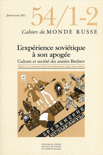
CAHIERS DU MONDE RUSSE
Cultivating Critical Perspectives on Russian HeritageCAHIERS DU MONDE RUSSE, published by EDITIONS ECOLE HAUTESETUDES & SCIENCES SOCIALES in France, is an esteemed journal dedicated to the interdisciplinary study of Russian history, culture, and politics. The journal embraces a variety of scholarly insights, making significant contributions to the fields of History, Political Science, and Sociology. With its ISSN 1252-6576 and E-ISSN 1777-5388, it has established a reliable presence in academic discourse since 1999, with continuous publications until 2024. Despite its current quartile rankings placing it in Q3 and Q4 categories in pivotal fields, CAHIERS DU MONDE RUSSE plays a critical role in fostering knowledge and discussion among researchers and students alike. It serves not only as a platform for disseminating research but also as a source of rigorous analysis and historical reflection, reflecting the dynamic evolution of Russian studies within the global context.
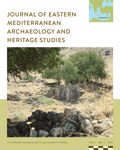
Journal of Eastern Mediterranean Archaeology and Heritage Studies
Bridging Scholarship and Conservation in ArchaeologyJournal of Eastern Mediterranean Archaeology and Heritage Studies, published by Penn State University Press, is a premier academic journal dedicated to the exploration and understanding of the archaeological and heritage landscapes of the Eastern Mediterranean region. With an ISSN of 2166-3548 and an E-ISSN of 2166-3556, this journal serves as an essential resource for researchers, professionals, and students in the fields of archaeology, conservation, and heritage studies. Its notable impact is reflected through its Q2 category rankings in both Archaeology and Conservation, coupled with commendable Scopus rankings, positioning it within the top quartiles of its disciplines. The journal not only fosters scholarly dialogue by publishing cutting-edge research but also aims to bridge the gap between academic inquiry and practical conservation efforts. As the field continues to evolve, this journal provides a vital forum for disseminating knowledge and advancing the preservation of cultural heritage, making it indispensable for all engaged in the study of the Eastern Mediterranean’s rich archaeological heritage.

Rivista Storica Dell Antichita
Illuminating the Rich Tapestry of Classical StudiesRivista Storica Dell Antichita is a distinguished academic journal published by PATRON EDITORE S R L, dedicated to advancing knowledge in the fields of Archaeology, Classics, and History. With an ISSN of 0300-340X, this journal serves as a crucial platform for scholars and researchers who seek to delve into the rich historical narratives of antiquity. Although it has discontinued its coverage in Scopus after 2021, its legacy reflects a commitment to fostering scholarly dialogue within the academic community, evident from its rankings in notable Scopus categories, including Q3 in Classics and Q4 in Archaeology and History. Additionally, Rivista Storica Dell Antichita boasts a substantial readership in Italy, contributing to the understanding of historical contexts and methodologies. As scholars engage with its authentic research articles, they will find in this journal a valuable resource that not only enhances academic discourse but also inspires future explorations into the ancient world.

Cahiers Mondes Anciens
Democratizing Access to Ancient WisdomCahiers Mondes Anciens is a distinguished Open Access journal dedicated to advancing the field of ancient studies, encompassing a wide array of disciplines such as archaeology, history, and cultural heritage. Published by CAHIERS MONDES ANCIENS, based in Paris, this journal has been providing seamless access to groundbreaking research since its inception in 2010, embodying a commitment to democratizing knowledge within the academic community. With an ISSN of 2107-0199, Cahiers Mondes Anciens offers a platform for researchers and scholars to share innovative findings, critical analyses, and interdisciplinary approaches that enrich our understanding of the ancient world. The journal is renowned for its rigorous peer-review process, ensuring the highest standards of scholarship. By fostering a vibrant community of academics, it plays a crucial role in the ongoing discourse surrounding ancient civilizations, making it an essential resource for professionals, students, and enthusiasts alike.

Gerion-Revista de Historia Antigua
Fostering Interdisciplinary Insights into AntiquityGerion-Revista de Historia Antigua is a prestigious academic journal published by UNIV COMPLUTENSE MADRID, SERVICIO PUBLICACIONES. Since its inception in 1983, this Open Access journal has been a vital platform for researchers and scholars in the fields of Archaeology, History, and Classics. Based in Madrid, Spain, the journal promotes rigorous scholarship and dissemination of knowledge covering a broad spectrum of ancient history and artifacts. With its impressive quartile rankings—Q1 in Classics and Q2 in both History and Archaeology—Gerion demonstrates a strong commitment to academic excellence, boasting a respectable presence within Scopus rankings. Researchers will find a collaborative space here, as the journal aims to support interdisciplinary dialogue and foster a deeper understanding of ancient civilizations. With its dedicated approach to quality and accessibility, Gerion is essential for anyone engaged in the study of our historical past, making it a valuable resource for students, professionals, and academics alike.

LATOMUS is a distinguished academic journal published by Peeters in Belgium, offering a rich platform for scholarly discourse in the fields of Classics, Archaeology, History, Literature, and Linguistics. With the ISSN 0023-8856 and E-ISSN 2294-4427, it has established itself as an essential resource for researchers and professionals seeking to contribute to and engage with critical debates within these disciplines. While not an Open Access journal, LATOMUS is recognized for its robust impact in the academic community, achieving Q2 and Q3 rankings across various categories, including Classics and Archaeology, according to the latest 2023 evaluations. The journal publishes articles that span a range of topics relevant to antiquity and its influences, making it a vital resource for those exploring historical narratives and linguistic developments. As a publication dedicated to advancing scholarly knowledge since its inception in 1971, LATOMUS continues to serve as a cornerstone of academic inquiry within the humanities, promoting intellectual engagement and disseminating high-quality research in its converged years from 1971 to 1974, 1980, and from 2002 to the present.

BULLETIN OF THE AMERICAN SOCIETY OF PAPYROLOGISTS
Unveiling the Secrets of Ancient TextsThe Bulletin of the American Society of Papyrologists is an esteemed journal dedicated to advancing the field of papyrology and related studies in archaeology and history. Published by Peeters, this journal offers a rich array of scholarly articles that delve into the analysis and interpretation of ancient manuscripts and inscriptions, shedding light on historical contexts and cultural nuances. Its impressive impact factor places it in the Q1 category for history and Q2 for archaeology in the 2023 rankings, affirming its significance within the academic community. Though not an open-access publication, the journal remains accessible to researchers and institutions, fostering a collaborative environment for sharing discoveries and scholarly dialogue. With its publication history dating back to 2002, the Bulletin continues to be an essential resource for scholars, historians, and students interested in the complexities of ancient texts and civilizations.
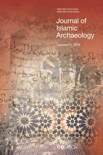
Journal of Islamic Archaeology
Illuminating the Past Through Islamic PerspectivesJournal of Islamic Archaeology is a distinguished publication dedicated to advancing the field of archaeology through the lens of Islamic heritage and culture. Published by EQUINOX PUBLISHING LTD, this journal provides a platform for researchers, professionals, and students to disseminate their findings and engage in critical dialogue regarding the archaeological aspects of Islamic societies from 2014 to the present. With an ISSN of 2051-9710 and E-ISSN 2051-9729, the journal is indexed within significant academic databases and positioned notably in the Q3 and Q2 quartiles for archaeology in the Arts and Humanities and Social Sciences categories, respectively. The journal fosters scholarly exchange and innovation, drawing attention to the rich tapestry of Islamic archaeology, and securing its role as an essential resource for practitioners and academics alike. Its commitment to rigorous peer-review and high-quality contributions ensures a valuable repository of knowledge, enhancing the understanding of an often underrepresented field in archaeology.
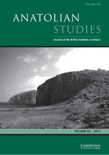
Anatolian Studies
Showcasing Innovative Discoveries in Anatolian StudiesAnatolian Studies, published by Cambridge University Press, stands as a premier forum for research in the fields of archaeology, cultural studies, and history. Established in 1951, this esteemed journal has consistently contributed to the academic discourse surrounding the rich and multifaceted history of Anatolia, earning its place in the Q1 category across multiple disciplines. With a notable impact factor reflected in its Scopus rankings, it ranks among the top journals in its fields: 78th in History, 155th in Cultural Studies, and 55th in Archaeology, showcasing its significant influence and recognition. This journal serves as an invaluable resource for researchers and scholars seeking to delve into the intricacies of Anatolian heritage, providing a platform for innovative research and critical discussion within the academic community. While it currently does not offer open access, Anatolian Studies continues to enrich scholarly resources and advance knowledge within its key areas of focus.

ARCHAEOLOGY
Unraveling Mysteries, Enriching KnowledgeARCHAEOLOGY is a distinguished peer-reviewed journal published by the Archaeological Institute of America, focusing on the multifaceted aspects of archaeological research and its relevance to contemporary society. Established in 1966, this journal serves as a critical platform for scholarly discourse in the field, showcasing innovative findings, theoretical advancements, and methodological discussions related to archaeology. While it maintains a Q4 ranking within the disciplines of archaeology and arts and humanities, its contributions remain valuable for those engaging in archaeological studies or seeking to understand historical and cultural narratives. The journal is accessible in print, with an ISSN of 0003-8113 and an E-ISSN of 1943-5746, ensuring that a wide audience can benefit from its insights. Although currently not classified as Open Access, the meticulous peer-review process ensures a high standard of academic rigor, making it an essential source for researchers, professionals, and students alike who are dedicated to exploring the past through archaeological lenses.